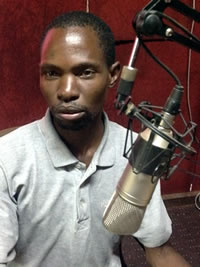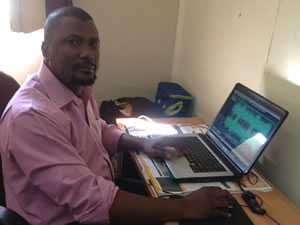AWR News
Stories
The Station that Cares
March 24, 2015 13:20
By Shelley Nolan Freesland
AWR Communications Director
One year ago, a letter arrived on the desk of Nalumino Nalumino, manager of Radio Maranatha FM in Kabwe, Zambia. It began:
“My regards to the station manager and the entire production team of the station that cares, Radio Maranatha. I was born in the Seventh-day Adventist Church and grew up in the Central Zambia Conference. I used to attend church services in Chibwe Adventist Church in Mukonchi Mission District, but I never thought of being baptized. “In 2005, I lost my younger sister. It was a very difficult moment for our family. My mother almost lost her faith, since the death of my sister disturbed her spiritually.”
 The young writer, a student named Mutinta Hachiboola, went on to describe how his mother, Betty, had sunk into depression. She stopped going to church for years, crying, “Why, when my daughter has died? Why didn’t God save my daughter?”
The young writer, a student named Mutinta Hachiboola, went on to describe how his mother, Betty, had sunk into depression. She stopped going to church for years, crying, “Why, when my daughter has died? Why didn’t God save my daughter?”
“But one day,” Mutinta wrote, “she tuned the radio to the station that cares, Radio Maranatha, where she was encouraged and shared her experience with us as a family.”
As Betty listened to the radio, she began to feel, “Something is wrong with me. I need to go back to the Lord.” She became more and more convicted about God’s love,hi even in the midst of her pain and desolation.
Betty did go back to church, and her rediscovered faith had an effect on her son. Mutinta developed a genuine interest in Christ and continued listening to the radio programs. He wrote, “I enjoyed the baptism class and finally gave my life to Christ in 2007. I became a baptized member of the Seventh-day Adventist Church because of Radio Maranatha. The radio station changed a lot of lives in the Central Zambia Conference.”
Nalumino – who has been with Radio Maranatha from its first broadcast 10 years ago – was deeply touched by Mutinta’s letter. But as he continued reading, he discovered the family was facing a new problem.
They had been living in a rural area, where the father, Robson, was the headmaster of one of the schools. However, he had recently been transferred to another school, and the family’s new home was beyond the reach of Radio Maranatha’s broadcast area. Mutinta wrote:
“Unfortunately, I was disconnected from Radio Maranatha when my father was transferred from Chibwe Basic School to Mubalashi in Kapiri Mposhi, Lukomba Mission. I’m really disturbed in terms of worship, because I lack access to Radio Maranatha.
“My appeal is to kindly consider the people in some parts of Kapiri Mposhi, by doing whatever you can to help them draw nearer to Christ by listening to Radio Maranatha. I miss listening to the radio station that cares, and I feel like I’m detached from the Adventist family. I hope and trust that through the Lord Jesus Christ, one day we will have access to the station.”
Nalumino thought long and hard about how he and the station could meet Mutinta’s need. The station’s resources were severely limited, and couldn’t be stretched to pay for a new, larger tower.
“What we did,” he says, “was to create a partnership with the private sector. An organization called GOtv agreed to install a 70-meter tower at our station, which was nearly double the height of our 40-meter tower. This new tower gives us wider coverage, so that Mutinta and his family – and many other new listeners – can hear the good news of Jesus.”
Radio Maranatha has a big presence in Zambia: its broadcasts reach about one million listeners – out of a total population of 14 million. Considerable credit for its success must be given to Nalumino’s insightful approach to programming. He says, “If you have a community that is sick, you have a church that is sick. If you have a community that is poor (because of poor agricultural practices), you have a church that is poor (and can only give tithe in kind). So we do programs on agriculture, on health, on security and community policing – programs with a social focus but a religious perspective.”
 One of Radio Maranatha’s more unique programs is a call-in show called “Apakomaila Nondo Apaliubulema.” This translates as “Where There Is Emphasis, That’s Where the Problem Is.” The program – presented by Eunice Chikuni – tackles issues such as love potions (“using charms such as leaves to find a husband or wife is not the way to go”), teenage pregnancy, cohabiting, where to look for a spouse (“Don’t rush. Look at yourself. Where are you searching for a spouse?”), and more. The hosts bring in pastors, community leaders, and even traditionalists, and show where certain cultural views conflict with the Bible. Listeners call in to express their views, and the station’s goal is to offer positive solutions.
One of Radio Maranatha’s more unique programs is a call-in show called “Apakomaila Nondo Apaliubulema.” This translates as “Where There Is Emphasis, That’s Where the Problem Is.” The program – presented by Eunice Chikuni – tackles issues such as love potions (“using charms such as leaves to find a husband or wife is not the way to go”), teenage pregnancy, cohabiting, where to look for a spouse (“Don’t rush. Look at yourself. Where are you searching for a spouse?”), and more. The hosts bring in pastors, community leaders, and even traditionalists, and show where certain cultural views conflict with the Bible. Listeners call in to express their views, and the station’s goal is to offer positive solutions.
“We are social beings, so our programs have a social focus,” Nalumino says. “Listeners are hearing these explanations from a biblical point of view for the very first time. They may have heard for many years that it’s ok to use charms, because after all, these charms are from the trees that God made. No! You need to depend on God to give you protection, to give you your spouse. We explain that at times the problem is that you may pray, ‘God, give me joy.’ But there is no faith in your thinking.
“Ultimately, we hear listeners saying, ‘You need to repeat this program! We need part two on Sunday next week! Can you bring that pastor back? He needs to explain what he meant by this and that.’”
More than once, a listener has come to the radio station, saying, “I want to see that pastor. I need to hear him explain things to me in person.”
After one special Sabbath broadcast, a mother called in to the station, crying, “My son left home threatening to commit suicide. For the past week, I haven’t known where he is. Perhaps he’s died. Can you pray for my son, Hendricks?”
Nalumino and his guest, Pastor Elvis Sichweza, made an appeal on the air:
“Hendricks, wherever you are, come to Radio Maranatha. God loves you. We’re praying for you.”
Miraculously, a few days later Hendricks did show up at the station. And the staff had the joy of placing a call to his mother – “Hendricks is here!” – and hearing her weep again, this time with tears of joy.
Other listeners are not able to come to the station, but they still reach out to Radio Maranatha. One man wrote from Mukobeko, Zambia’s maximum security prison:
“My name is Saidi Banda. I am a condemned prisoner in the death-row section. I get nourishment from most of your programs. Maranatha is the reason why I listen to my radio.”
Celebrating 10 years of broadcasting, Nalumino is looking ahead and working on ways to bring the nourishment of God’s love to even more listeners. “We are applying for a national broadcast license so that we can broadcast countrywide,” he says. “The government has recognized our work and told us that they will help us go national. This is a huge undertaking – not only to invest in additional transmitters, but also to pay for electricity, security, annual license fees, improved program production to cater to people in other parts of the country, and more – and we truly do not know where the resources will come from. But being a faith project, we are sure God will help us meet the challenge.
“We are praying for the government to grant the license, so that we can reach out to more people like Mutinta and Hendricks and Saidi. That’s the only way to remain relevant and fulfill the commission of ‘Go ye therefore’: by showing that we are continuing to reach more and more people with the advent message.”
Ways you can support
Adventist World Radio:











